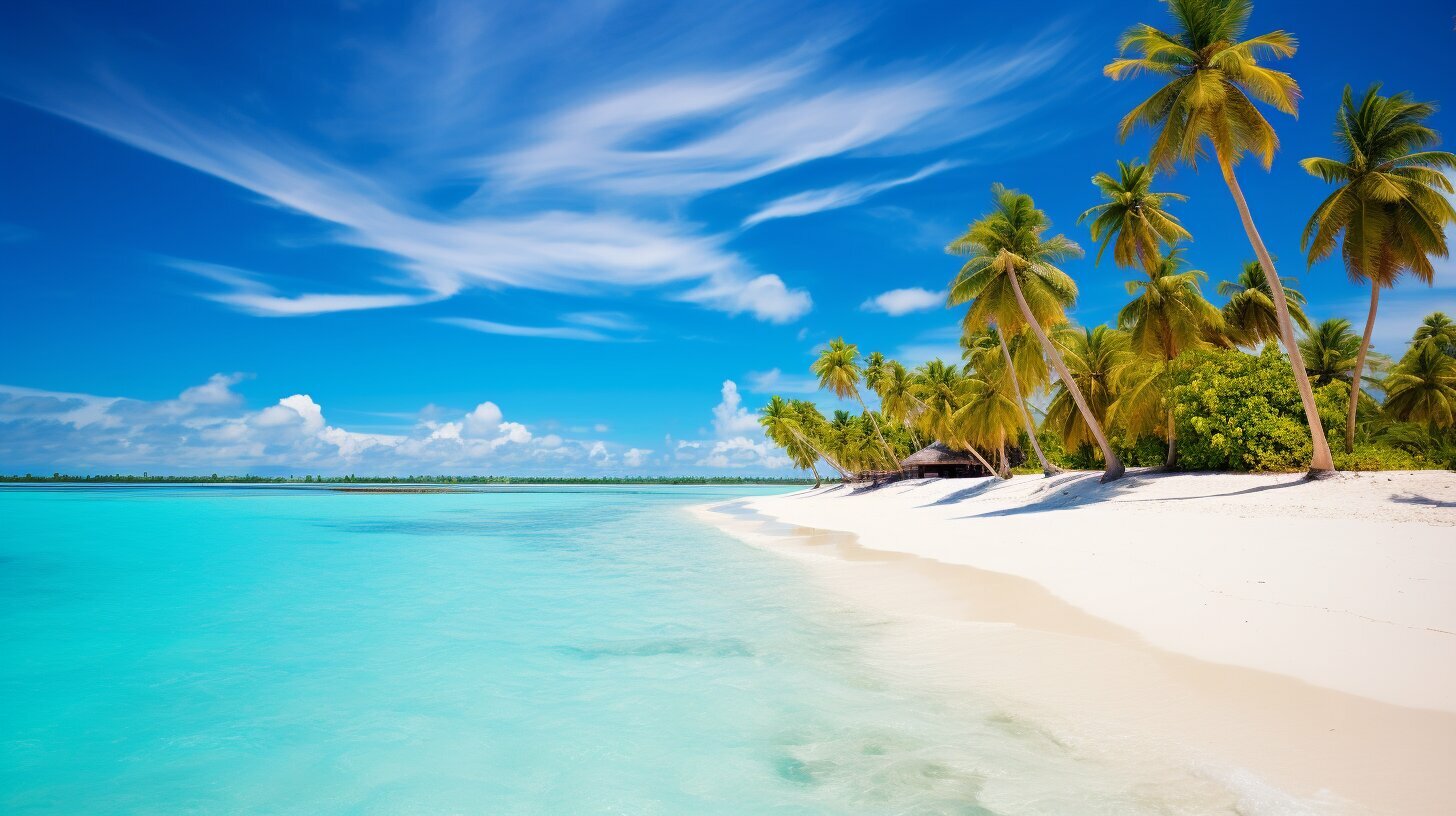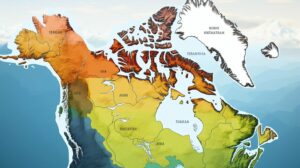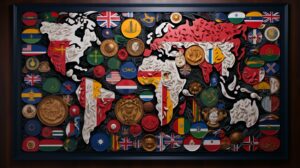The Maldives is an independent island country located in the north-central Indian Ocean, comprised of a chain of approximately 1,200 small coral islands and sandbanks. These islands stretch over 510 miles from north to south and 80 miles from east to west. About 200 of these islands are inhabited, while the rest remain untouched and pristine.
Key Takeaways:
- The Maldives is an independent island country in the north-central Indian Ocean.
- It is made up of around 1,200 small coral islands and sandbanks.
- The islands extend over 510 miles from north to south and 80 miles from east to west.
- About 200 of the islands are inhabited.
- The Maldives is known for its pristine and untouched natural beauty.
Exploring the Maldives’ Geography
The Maldives is a captivating island nation located in the north-central Indian Ocean. Spanning over 510 miles from north to south and 80 miles from east to west, this tropical paradise is made up of approximately 1,200 small coral islands and sandbanks. Out of these, around 200 are inhabited, offering a unique blend of pristine natural beauty and vibrant local communities.
One of the remarkable geographical features of the Maldives is its northernmost atoll, situated about 370 miles south-southwest of the Indian mainland and approximately 400 miles southwest of Sri Lanka. It is here that you can discover the breathtaking beauty of the Maldives’ islands and experience their distinct charm.
The Maldives’ geography is truly one-of-a-kind, with its islands scattered across the vast Indian Ocean. To help you gain a better understanding, here is a table showcasing the distribution of the Maldives’ inhabited atolls:
| Atoll | Number of Inhabited Islands |
|---|---|
| Male Atoll | 8 |
| Ari Atoll | 24 |
| Baa Atoll | 13 |
| Lhaviyani Atoll | 6 |
As you can see, the Maldives offers a diverse range of atolls, each with its own distinct characteristics and attractions. From the bustling capital of Male in the Male Atoll to the serene beauty of the Lhaviyani Atoll, there is something for every traveler to explore and enjoy.
So, whether you’re an adventure seeker, a beach lover, or someone fascinated by unique cultural experiences, the Maldives’ geography promises to amaze and captivate you at every turn.
Discovering the Maldives’ Culture and Government
The Maldives operates as a multiparty republic with one legislative house, while Islam is the state religion and the official language is Dhivehi. This unique blend of political and cultural influences shapes the identity of the Maldives.
The Maldivian culture is deeply rooted in Islamic traditions, with a strong emphasis on family, community, and religious observance. Islam plays a central role in everyday life, influencing various aspects such as dress, diet, and social norms. The Maldivian people are known for their warm hospitality, and visitors can experience the genuine kindness and friendliness of the locals.
The government of the Maldives is structured as a multiparty democracy, with a president serving as both the head of state and the head of government. The president is elected by the people and serves a five-year term. The parliament, known as the People’s Majlis, consists of elected representatives who are responsible for making and amending laws.
The Maldives’ Cultural Highlights
When visiting the Maldives, travelers have the opportunity to immerse themselves in the rich culture of the islands. Here are some cultural highlights:
- Local Cuisine: Sample traditional Maldivian dishes, such as garudhiya (fish soup), mas huni (tuna and coconut salad), and hedhikaa (a variety of savory snacks).
- Music and Dance: Experience traditional Bodu Beru performances, where drummers and dancers create a lively atmosphere with their rhythmic beats and colorful costumes.
- Art and Handicrafts: Explore local markets where artisans showcase their intricate craftsmanship in woodcarvings, lacquerware, and woven items.
These cultural experiences offer a glimpse into the unique heritage of the Maldives, allowing visitors to appreciate the country beyond its stunning natural beauty and luxurious resorts.
| Fact | Information |
|---|---|
| Official Language | Dhivehi |
| Political Structure | Multiparty Republic |
| Legislative House | One |
| Religion | Islam (State Religion) |
With its vibrant culture and unique political system, the Maldives offers visitors not only a paradise for relaxation but also a deeper understanding of the traditions and values that define the country.
Unveiling the Maldives’ Tourism Industry
The Maldives is renowned for its tourism industry, boasting over 130 resort islands and offering a wide range of activities and attractions for travelers. This Indian Ocean paradise attracts visitors from around the world with its pristine white sandy beaches, crystal-clear turquoise waters, and abundant marine life.
With so many resort islands to choose from, travelers can find the perfect retreat to suit their preferences. From luxurious and secluded private villas to family-friendly resorts with a variety of amenities, the Maldives caters to every type of vacationer. Whether you’re seeking relaxation, adventure, or both, the Maldives has something for everyone.
One of the main draws of the Maldives is its exceptional snorkeling and diving opportunities. The coral reefs surrounding the islands are teeming with colorful marine life, making it a haven for underwater enthusiasts. From swimming with manta rays and whale sharks to exploring vibrant coral gardens, the Maldives offers unforgettable underwater experiences.
Must-Visit Attractions in the Maldives
- Male: The capital city of the Maldives is a bustling hub of activity, offering a blend of traditional and modern attractions. Visit the Grand Friday Mosque, the largest mosque in the Maldives, and explore the narrow streets of the historic quarter.
- Ari Atoll: Home to some of the best diving spots in the Maldives, the Ari Atoll is a must-visit for diving enthusiasts. Discover an array of marine life, including sharks, turtles, and vibrant coral reefs.
- Baa Atoll: This UNESCO Biosphere Reserve is known for its pristine natural beauty. Explore the rich biodiversity of the area, including rare species like manta rays and whale sharks.
- Maafushi Island: For a taste of local culture, head to Maafushi Island. This inhabited island offers a glimpse into the everyday life of Maldivian locals, with traditional houses, small shops, and restaurants serving authentic cuisine.
Immerse yourself in the beauty of the Maldives and create memories that will last a lifetime. Whether you’re looking for a romantic honeymoon, a family adventure, or simply a tranquil getaway, the Maldives offers a slice of paradise like no other.
| Fact | Information |
|---|---|
| Number of Resort Islands | Over 130 |
| Main Economic Drivers | Tourism, fishing, boatbuilding, and boat repairing |
| Capital | Male, located in the Male Atoll |
| Tourist Activities | Snorkeling, diving, water sports, spa treatments, beachcombing |
A Glimpse into the Maldives’ Capital and Climate
The capital of the Maldives is Male, located on the largest island in the Male Atoll. This vibrant city is not only the administrative center but also the economic and cultural hub of the country. With its bustling streets, colorful markets, and stunning waterfront views, Male offers a glimpse into the unique charm of the Maldives.
Situated amidst turquoise waters and surrounded by coral reefs, the Maldives enjoys a tropical climate with consistently warm temperatures throughout the year. Whether you visit during the summer or winter months, you can expect pleasant weather and the opportunity to indulge in various outdoor activities.
With average temperatures ranging from 77°F to 88°F (25°C to 31°C), you can immerse yourself in the breathtaking beauty of this island paradise. From exploring vibrant coral gardens to lounging on pristine white-sand beaches, the Maldives offers endless opportunities for relaxation and adventure.
A Tropical Paradise Awaits
As you step foot in the Maldives, you’ll be greeted by a warm welcome and a sense of tranquility that permeates the air. Apart from its natural beauty and idyllic beaches, the Maldives also boasts a vibrant culture, influenced by its historical ties to neighboring countries in the Indian Ocean region.
While enjoying the tropical climate, you can also explore the unique traditions and customs of the Maldivian people. From vibrant festivals to delicious local cuisine, the cultural experiences in the Maldives are just as captivating as its natural wonders.
So, if you’re dreaming of a tropical escape with warm weather, stunning beaches, and a rich cultural heritage, look no further than the Maldives. This enchanting paradise beckons you to discover its beauty and create unforgettable memories in the heart of the Indian Ocean.
FAQ
Q: What country is the Maldives in?
A: The Maldives is an independent island country located in the north-central Indian Ocean.
Q: Where is the Maldives located?
A: The Maldives extends over 510 miles from north to south and 80 miles from east to west. The northernmost atoll is about 370 miles south-southwest of the Indian mainland and about 400 miles southwest of Sri Lanka.
Q: How many islands make up the Maldives?
A: The Maldives is made up of a chain of approximately 1,200 small coral islands and sandbanks, of which about 200 are inhabited.
Q: What is the official language of the Maldives?
A: The official language of the Maldives is Dhivehi.
Q: What is the government structure of the Maldives?
A: The Maldives operates as a multiparty republic with one legislative house.
Q: What is the main industry in the Maldives?
A: The Maldives’ economy is primarily driven by tourism, fishing, boatbuilding, and boat repairing.
Q: Where is the capital of the Maldives?
A: The capital of the Maldives is Male, situated on the largest island in the Male Atoll.
Q: What is the climate like in the Maldives?
A: The Maldives has a tropical climate, with warm temperatures throughout the year.
Q: What is the state religion in the Maldives?
A: Islam is the state religion in the Maldives, and non-Muslims cannot become citizens.



